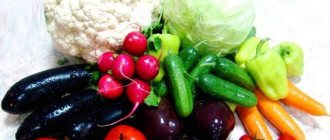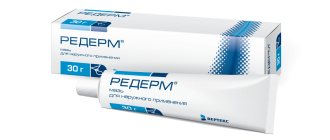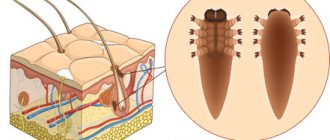Diet for eczema: facts
Practice shows that people suffering from eczema, to prevent exacerbations of symptoms, often adhere to all kinds of diets found in medical books and on the Internet. (Practice shows that people who suffer from eczema do their best to get rid of irritation and itching of the skin. In this regard, they often adhere to all kinds of diets found in medical books and on the Internet.)
How effective are these diets? Research results on this issue are mixed.
This article provides expert advice on choosing a diet for eczema.
Diet for eczema in children
Some young children suffer from eczema due to allergic reactions to certain foods. Whereas in children over 3-4 years of age, eczema caused by allergic reactions to food is very rare. In these children, the food may cause rashes and other skin reactions, but not eczema.
If you suspect that your child's eczema is due to food allergies, be sure to consult with your doctor. Keep in mind that food allergy test results are not always reliable; it is best to double-check them. Test results for food allergies to certain foods are often positive, even if the child does not have any allergies at all. Therefore, these tests must be taken as prescribed by your doctor.
Detailed menu for the week (table)
The nutrition plan should be drawn up by a nutritionist or attending physician, taking into account personal data and tests, but below is a sample menu that you can rely on. Deviation from the course of nutrition can provoke an increase in symptoms, as well as food restrictions. Diet menu for eczema for a week:
| Day of the week | Breakfast | Dinner | Afternoon snack | Dinner |
| Monday | Pear, homemade yogurt with raisins, juice. | Chicken broth soup, vegetable salad, compote. | Baked apple. | Vegetable salad, baked potatoes, bread. |
| Tuesday | Cottage cheese, any fruit, green tea. | Steamed fish, rice, stewed vegetables. | A glass of fermented baked milk and cookies. | Vegetable casserole, bread, tea. |
| Wednesday | Yogurt, allowed fruit and tea. | Boiled or steamed turkey, boiled vegetables, compote. | Cottage cheese and natural juice. | Barley porridge, vegetable salad, tea. |
| Thursday | Corn porridge, compote. | Baked fish, mashed potatoes, vegetables. | Cottage cheese with berries, green tea. | Boiled chicken, salad, tea. |
| Friday | Oatmeal, compote. | Borsch, steamed cutlet, vegetable salad. | Baked apples, a glass of fermented baked milk. | Stewed turkey with vegetables, dried fruit compote. |
| Saturday | Oatmeal, bread, a handful of berries (cranberries, lingonberries). | Vegetable puree, steamed cutlets, tea. | Green tea, cottage cheese. | Stewed mushrooms, mashed potatoes, cabbage salad. |
| Sunday | Wheat porridge, bread. | Fish cutlet, buckwheat, salad and tea. | Fruit salad with yogurt. | Vegetable stew, chicken, compote. |
Eczema and diet in adults
Despite the claims of some patients that they develop eczema precisely after eating certain dishes and products, to date there are no scientific studies confirming this.
Although modern science does not have information linking the consumption of certain types of food with exacerbation of the disease, scientists do not exclude the possibility of individual reactions of the body in individual people. For example, if a patient notices a worsening of eczema symptoms after eating chocolate, then to prevent the symptoms of the disease from worsening, it is better to reduce or eliminate this product from the diet. But before making any changes to your diet, you should consult your doctor.
Determining the cause of an exacerbation of eczema can be extremely difficult. Every day there are many potential causes for exacerbation, and identifying what exactly was the trigger is not easy. Sometimes patients feel that their eczema is getting worse due to taking specific foods, but later the doctor finds out that the cause was, for example, stress or something else.
Healthy recipes
We suggest that you familiarize yourself with some of the dishes allowed in the treatment of eczema both in childhood and among adults.
Recipe for steamed cutlets.
Ingredients: 500 g of minced chicken, 2 raw yolks (the whites must be carefully separated and not added to the dish, as they may provoke an allergic process), dill or parsley, salt.
Method of preparation: combine the minced meat with the yolks, herbs and a small pinch of salt, mix thoroughly and refrigerate for 30 minutes. After the specified time, form the cutlets and place them in a steaming container designed for a multicooker. Pour water into the bowl, place the container with the future cutlets and set the “Baking” or “Steam” mode. In most slow cookers, this dish takes about 45 minutes to prepare.
Recipe for stuffed zucchini.
Ingredients: 3 zucchini, 800 g minced chicken, 2 raw yolks, 1 cup rice, 1 onion, salt.
Method of preparation: cut the peeled zucchini into rings approximately 3 cm thick and place in a baking dish. Rinse the rice thoroughly, mix it with chopped onion, yolks and minced meat, add a little salt. Place the filling on the zucchini rings and bake the dish for 45 minutes in the oven at 180°C. Ready stuffed zucchini can be seasoned with low-fat sour cream and herbs to taste.
Pumpkin casserole recipe.
Ingredients: 500 g pumpkin, 50 g prunes, 1 yolk, 1 glass low-fat cream.
Method of preparation: cut the pumpkin into slices and simmer until soft, brew the prunes in boiling water and leave for 10 minutes. Combine the yolk with cream and beat. Place pumpkin puree and prunes in a greased baking dish, pour in cream and bake for 30 minutes in the oven at 200°C.
Research into identifying foods that may help with eczema
Although many types of foods and dietary supplements have not been shown to be effective in combating eczema, research in this direction continues.
Separate studies have found that taking probiotics, beneficial live microorganisms found in foods such as yogurt and various supplements, may help relieve symptoms of eczema in children. Most of these studies have been conducted in different countries using different types of probiotics, so the question of which type of live microorganism is most beneficial remains an open question.
The next product that has been researched to help relieve the symptoms of eczema is tea. However, to date there is no reliable evidence that drinking black, green or oolong tea actually improves the symptoms of the disease.
In addition, research is being conducted on omega-3 fatty acids found in fish and fish oil and their possible beneficial effects on eczema flare-ups.
Prohibited Products
According to the degree of allergenicity, all products can be divided into highly, moderately and lowly allergenic.
First of all, it is necessary to exclude everything fried, smoked, salted, spicy, as well as semi-finished meat and fish products - cutlets, sausages, fishburgers, sausage, as they contain a large amount of flavoring and aromatic additives and stabilizers.
List of prohibited products:
- Citrus fruits (oranges, tangerines, lemons, grapefruits).
- Nuts (hazelnuts, almonds, peanuts).
- Fish, seafood and fish products (fresh and salted fish, fish broths, canned fish, caviar).
- Poultry (goose, duck, chicken) and products made from them.
- Chocolate and chocolate products.
- Coffee.
- Smoked products.
- Vinegar, mustard, mayonnaise and spices.
- Horseradish, radish, radish.
- Tomatoes, eggplants, red peppers.
- Eggs and milk.
- Strawberries, wild strawberries, pineapple, grapes, melon, watermelon and other red and orange fruits.
- Pastry products, yeast.
- Honey.
- Alcoholic drinks.
Sources
- Carrasco P., Estarlich M., Iñiguez C., Ferrero A., Murcia M., Esplugues A., Vioque J., Marina LS., Zabaleta C., Iriarte G., Fernández-Somoano A., Tardon A., Vrijheid M., Sunyer J., Ballester F., Llop S. Pre and postnatal exposure to mercury and respiratory health in preschool children from the Spanish INMA Birth Cohort Study. // Sci Total Environ - 2022 - Vol782 - NNULL - p.146654; PMID:33838378
- Zarini GG., Masters J., McLean MA., Strobel CT. Clinical and Anthropometric Improvements with a Tailored Dietary Approach in Pediatric Crohn's Disease. // Altern Ther Health Med - 2022 - Vol - NNULL - p.; PMID:33711815
- Logan CD., Norton SA. At the dinner table with Adam and Eve. // Pediatr Dermatol - 2022 - Vol - NNULL - p.; PMID:33656169
- Trikamjee T., Comberiati P., D'Auria E., Peroni D., Zuccotti G.V. Nutritional Factors in the Prevention of Atopic Dermatitis in Children. // Front Pediatr - 2022 - Vol8 - NNULL - p.577413; PMID:33585361
- No authors found Correction: Ethnic differences in maternal diet in pregnancy and infant eczema. // PLoS One - 2022 - Vol16 - N1 - p.e0246481; PMID:33508000
- Ogawa K., Pak K., Yamamoto-Hanada K., Ishitsuka K., Sasaki H., Mezawa H., Saito-Abe M., Sato M., Yang L., Nishizato M., Konishi M., Sago H ., Ohya Y. Association between maternal vegetable intake during pregnancy and allergy in offspring: Japan Environment and Children's Study. // PLoS One - 2022 - Vol16 - N1 - p.e0245782; PMID:33507986
- Ross AB., Barman M., Hartvigsson O., Lundell AC., Savolainen O., Hesselmar B., Wold AE., Sandberg AS. Umbilical cord blood metabolome differs in relation to delivery mode, birth order and sex, maternal diet and possibly future allergy development in rural children. // PLoS One - 2022 - Vol16 - N1 - p.e0242978; PMID:33493154
- Ballart M.J., Monrroy H., Iruretagoyena M., Parada A., Torres J., Espino A. . // Rev Med Chil - 2022 - Vol148 - N6 - p.831-841; PMID:33480383
- Tanaka K., Okubo H., Sasaki S., Arakawa M., Miyake Y. Maternal caffeine intake during pregnancy and risk of food allergy in young Japanese children. // J Paediatr Child Health - 2022 - Vol - NNULL - p.; PMID:33464698
- Chan CWH., Leung TF., Choi KC., Tsui SKW., Wong CL., Chow KM., Chan JYW. Association of early-life gut microbiome and lifestyle factors in the development of eczema in Hong Kong infants. // Exp Dermatol - 2022 - Vol - NNULL - p.; PMID:33433023
Clinical researches
Conducted clinical studies prove the high efficiency, safety and tolerability of the products. The cream for sensitive skin is suitable for daily care of adult and children's skin with mild to moderate forms of atopic dermatitis and during remission. As a result of therapy, a decrease in the activity of the inflammatory process, a decrease in dryness, itching and flaking was noted.
Many remedies are recommended by the Union of Pediatricians of Russia.
Sources:
- Ratner Desiri, Avram M.R., Avram M.M., Procedures in Dermatology. Clinical cosmetology, GEOTAR-Media, 2022.
- Sukolin Gennady Ivanovich, Clinical dermatology. A short guide to the diagnosis and treatment of dermatoses, Notabene, 2017.
- Sukolin Gennady Ivanovich, Illustrated clinical dermatology. Brief alphabetical reference book, Lux Print publishing house, 2010.
Photos of eczema
Photo album on the disease
What to eat and what not to eat
Nutrition for eczema should be balanced and include healthy foods, vitamins and minerals. The main emphasis is on protein and plant foods. It is allowed to eat lean meat, fish, vegetables, cottage cheese, kefir, and yoghurt.
Exclude from the diet all fatty foods, sweets, baked goods, instant foods, and full-fat milk.
During an exacerbation period, berries and nuts are prohibited. Potatoes are allowed in moderation.
During the treatment period, special attention is paid to cosmetic products and compliance with hygiene rules.
A diet for eczema helps normalize metabolism and speed up the process of cleansing toxins. With proper nutrition, a person can cope with the disease without treatment with pills.











